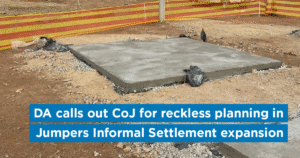The Gauteng Department of Human Settlements (GDHS) continues to fail residents in desperate need of dignified housing because of its erroneous impression that mega-housing projects are the solution to the province’s housing crisis.
The GDHS has created 89,261 housing opportunities between 2019 and 2024. This includes 46,211 serviced sites and 43,050 housing units.
While these numbers might seem impressive, they pale in comparison to the housing backlog of 1.2 million units. At this rate, it will take 67 years to clear the backlog – assuming no new migrants arrive in Gauteng. However, with approximately 300,000 new people arriving annually, this assumption is far from reality.
The department is placing its hopes on mega housing projects, which are designed to include at least 10,000 homes and social amenities like parks, schools, and community centres. While this may sound promising, these developments are often located in areas with high unemployment and few economic opportunities.
The government’s plan to stimulate local economies by building taxi ranks, business hubs, and industrial parks near these settlements is rooted in wishful thinking rather than strategic planning. Hope is not a strategy and given the government’s track record of project delays and cost overruns, this approach is unlikely to succeed.
The lack of skilled personnel, budget constraints, and municipal inefficiencies in providing basic infrastructure such as water and electricity are further compounding the issue. Some of the older mega-housing projects have dragged on for 13 years without being completed, draining public resources and eroding public trust.
Moreover, placing these mega housing projects on the outskirts of cities risks further fragmenting the urban form, isolating residents from economic hubs and services.
Gauteng needs a more integrated, sustainable approach to housing, one that doesn’t rely on disconnected mega-housing projects but instead focuses on creating mixed-use, economically vibrant communities close to job opportunities.
Without a comprehensive, realistic strategy, the housing crisis will only worsen, leaving millions without adequate shelter for decades to come.









